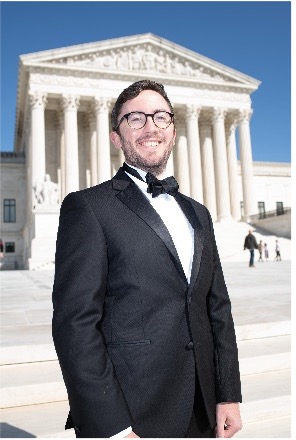Tiernan Fitzgibbon
2021 Pegasus Scholar
“Always remember that the law can be used as a force for good in the world.”

With those words, Justice Sotomayor turned and made her way through the great and good of the American legal profession who had gathered at the US Supreme Court to attend the American Inns of Court black tie Celebration of Excellence awards ceremony.
It was, without a shadow of a doubt, the highlight of my Pegasus Scholarship.
Over the course of the Scholarship’s six weeks, five states and one federal district, I was exposed to the full cross-spectrum of the American legal system at both federal and state level. From how a jury is constituted (in both criminal and civil cases) to discussions with federal judges on their jurisprudential approach to cases, the scholarship was an eye-opening experience of a system that can sometimes feel all too familiar from the legal dramas that populate our TV screens.
Although a lot of the American legal system will be familiar to English lawyers, I learned there are important differences between the two systems.
The first, and perhaps most obvious difference on the ground, is the level of resources available to the American system compared to the English system. Courts in the US are truly temples of justice with immense resources behind them. Judges routinely have 3 or 4 legally trained assistants (or clerks) to assist them with researching cases and drafting judgments. The courts themselves are pristine and well resourced, oftentimes coming with canteens that served excellent food. All in all, it makes a stark contrast with the present state of the Court estate in some parts of England and Wales.
Secondly, in many states there exists an automatic right of appeal in civil cases. Given the well documented backlog of cases in England and Wales, it was inconceivable to me that such a permissive system of appeals could exist given how litigious a jurisdiction that the US is known for being. Indeed, even in the DC Court of Appeals (known for being a feeder court for the US Supreme Court) we observed appeals that would never have received permission in the UK. Part of the reason that the American system is not as overwhelmed as one might think, perhaps, is due to the third important difference that I observed.
Third, and perhaps most differently of all, is the approach that the American legal system takes towards costs. The starting assumption in the US, or the “American rule” as it is called, is that parties will bear their own costs rather than the loser pays approach in England and Wales. Given this, it makes sense that parties may not necessarily exercise their automatic right of appeal given that there is no way of recovering their costs. It does not necessarily sit well with the notion of how litigious the US from a foreign perspective however!
Differences aside, one the best aspects of the program was being able to observe innovations in the US courts that could potentially be translated to the UK. Although not part of our practice areas, we spent a day at the Brooklyn Supreme Court where we were introduced to the workings of the Mental Health Courts and the Integrated Domestic Violence Courts. The Mental Health Courts are a pioneering system designed to integrate treatment into the judicial system in order to ensure that people who need access to mental health treatment are given the necessary support with supervision from the judiciary to ensure that the programme is being adhered to through regular check ins with the supervising judge. In a similar vein, the Integrated Domestic Violence Court is an initiative designed to ensure all aspects of a case involving domestic violence (including the criminal case, any divorce or family proceedings) are dealt with by one court in front of a single judge rather than being dealt with piecemeal across the court system.
Another aspect of the US system that was very impressive (and entirely unexpected) was the deep commitment to mooting cases before they go to superior courts. Indeed, almost every law firm that we encountered had a courtroom built into their offices for just this purpose. We were fortunate to observe a moot at the Supreme Court Institute (“SCI”) in Georgetown University. This is an entirely free and confidential service provided by the University to any party appearing before the US Supreme Court. In order to preserve confidentiality, however, only one party to proceedings are allowed to moot at the SCI. If both parties apply, then the party will be chosen by means of a coin toss. The SCI will procure a panel of “judges” from lawyers who regularly appear before the Supreme Court or academics who have subject matter expertise in the matter to be heard, all of whom give their time voluntarily. The party will then present their case to the panel who will give feedback and critique the submissions. Given that the majority of practising barristers will not have received any neutral feedback on submissions since Bar school, this could be a very welcome development were the Bar to adopt it!
And although the law was at the heart of the Scholarship, there was plenty of time to explore all that the US has to offer from hunting down the best Philly Cheesesteak in Philadelphia to an architectural boat tour of the Manhattan skyline.
I am incredibly grateful to all those who helped make this Scholarship happen, including all the judges and attorneys who so graciously gave up their time to field questions from a pair of wandering barristers. In particular, I would like to thank Cindy Dennis of the American Inns of Court and our hosts at MoloLamken LLP who put together our excellent program and looked after us so well. The memories and experiences of those 6 weeks will stay with me for a long time and will undoubtedly influence the development of my practice into the future.